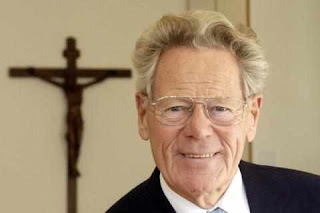 I found this article on Hans Kung's call to all Catholics for a peaceful revolution against the absolutism of the papal power published in National Catholic Reporter. Hans Kung has been a consistent critic of the Vatican's conservative bloc. The conservative bloc, with Pope Benedict XVI as its prominent leader, controlled the Vatican's Roman Curia, and responsible in appointing conservative bishops in the local churches, and in silencing Church theologians who are perceived as reformists. Formed as the restoration movement in the Church today, they do not only derail the full implementation of the Vatican II but want to reform the Vatican II reformation. With the absolute power of the Pope, the reforms of Vatican II will be set aside and the restoration efforts of the conservative bloc are now on-going. Thus, Hans Kung urges all Catholics to be vigilant to protect the fruits of Vatican II and launches a peaceful revolution against Roman absolutism. This article is a good read. I included below the full video interview and its transcript "What Went Wrong With Catholic Church?" of Hans Kung by Anthony Padovado. Plus, the earlier video interview of Hans Kung titled "Catholicism Heading Back to Middle-Ages". Kudos.
I found this article on Hans Kung's call to all Catholics for a peaceful revolution against the absolutism of the papal power published in National Catholic Reporter. Hans Kung has been a consistent critic of the Vatican's conservative bloc. The conservative bloc, with Pope Benedict XVI as its prominent leader, controlled the Vatican's Roman Curia, and responsible in appointing conservative bishops in the local churches, and in silencing Church theologians who are perceived as reformists. Formed as the restoration movement in the Church today, they do not only derail the full implementation of the Vatican II but want to reform the Vatican II reformation. With the absolute power of the Pope, the reforms of Vatican II will be set aside and the restoration efforts of the conservative bloc are now on-going. Thus, Hans Kung urges all Catholics to be vigilant to protect the fruits of Vatican II and launches a peaceful revolution against Roman absolutism. This article is a good read. I included below the full video interview and its transcript "What Went Wrong With Catholic Church?" of Hans Kung by Anthony Padovado. Plus, the earlier video interview of Hans Kung titled "Catholicism Heading Back to Middle-Ages". Kudos.
Hans
Kung urges peaceful revolution
against Roman absolutism
against Roman absolutism
'few
people realize how powerful the pope is,' Kung said
By Jerry Filteau
Jun. 11, 2011
DETROIT -- Famed theologian Fr. Hans Kung has called for a “peaceful” revolution by world Catholics against the absolutism of papal power.


